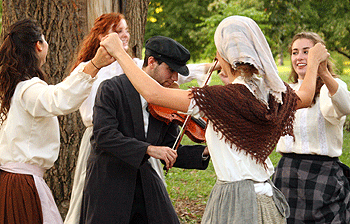The Performing Arts Department (PAD) in Arts & Sciences will present Fiddler on the Roof, one of Broadway’s most beloved musicals, as its fall mainstage production.
Set in the small Jewish shtetl, or town, of Anatevka, Fiddler on the Roof tells the story of Tevye, a hardworking milkman who struggles to maintain family and religious traditions amidst the turmoil of pre-revolutionary Russia.

In particular, Tevye and his wife, Golde, must find suitable husbands for their three eldest daughters: Tzeitel, Chava and Hodel. Yet the girls are strong-willed and, breaking with custom, prefer to make their own matches.
“Fiddler on the Roof is about the disintegration of a way of life,” said Jeffery S. Matthews, senior lecturer, who directs the cast of 45. “It’s very funny and very touching, but it’s also bittersweet and emotionally powerful. Everything is alive in this world. It has all the textures of life.”
The story begins when Yente, the traditional matchmaker, informs Golde that Lazar Wolf, a wealthy older butcher, wants to wed Tzeitel. Yet Tzeitel resists (Wolf is the same age as her father), preferring her childhood friend Motel, a penniless tailor.
Meanwhile, Hodel, the second-oldest daughter, falls in love with Perchik, a student radical from Kiev; while Chava, the middle daughter, begins a secret relationship with Fyedka, a handsome Russian peasant.
“Tevye sees Motel as completely unsatisfactory but Tzeitel pleads with him,” Matthews explained. “Hodel and Perchik don’t even ask Tevye’s permission, which infuriates him.
“At the same time, Hodel is with a man she loves, so in a way Tevye is happy for them. But Chava’s suitor, Fyedka, is a gentile and completely outside the faith. That’s where Tevye breaks.”
Fiddler is loosely based on the book Tevye and His Daughters (1894) by the Yiddish writer Sholom Aleichem (1859-1916). The Broadway adaptation opened in 1964, featuring music by Jerry Bock, lyrics by Sheldon Harnick and libretto by Joseph Stein.
The title and design of the show were inspired by the work of painter Marc Chagall (1887-1985), whose fractured, modernist imagery often depicted the folk heritage of Eastern European Jewish life.
The score included such now-standard songs as “If I Were a Rich Man,” “Matchmaker, Matchmaker,” “Sunrise, Sunset” and “To Life.” Zero Mostel and later Chaim Topol starred as Tevye.
Topol reprised the role in 1971, for Norman Jewison’s Academy Award-winning film adaptation.
Most recently, a revised version ran on Broadway from 2004-06, featuring Alfred Molina and later Harvey Fierstein as Tevye.
The PAD cast is led by David Weiss as Tevye, with Lauren Dusek as Golde; Jackie Dodd as Tzeitel; Carolina Reiter as Hodel; and Catherine Moreton as Chava. Also starring are Nathan Wineienger as Lazar Wolf; Micah Herstand as Motel; Kevin Gale as Perchik; and Jonathan King as Fyedka.
Sari Abraham is featured as Yente. Noga Landau is Fruma-Sarah, Wolf’s first wife, and Jade Roseberry is Grandma Tzeitel, Golde’s grandmother. Jonathan Baude plays a Russian constable (and friend of Tevye), who must reluctantly orchestrate a pogrom against the Jews.
Sets are by Justin Barisonek, a 2002 PAD alumnus and technical director for Saint Louis University. Numerous props — including an onstage water pump — are on loan from The Muny in Forest Park.
Senior Leah Battin designed costumes as part of a senior honors thesis project. Choreography is by Christine Knoblauch-O’Neal, senior lecturer and director of the PAD’s Ballet Program. Musical director is Lisa Campbell-Albert, lecturer in music in Arts & Sciences.
Rabbi Hershey Novack, director of the campus Chabad, served as a consultant for the production.
Performances begin at 8 p.m. Friday and Saturday, Oct. 27 and 28, and at 2 p.m. Sunday, Oct. 29, in Edison Theatre. Performances continue the following weekend at 8 p.m. Nov. 3 and 4; and at 2 p.m. Nov. 5.
Tickets are $15, $9 for students, senior citizens and WUSTL faculty and staff and are available through the Edison Theatre Box Office at 935-6543 and all MetroTix outlets. For more information, call 935-6543.